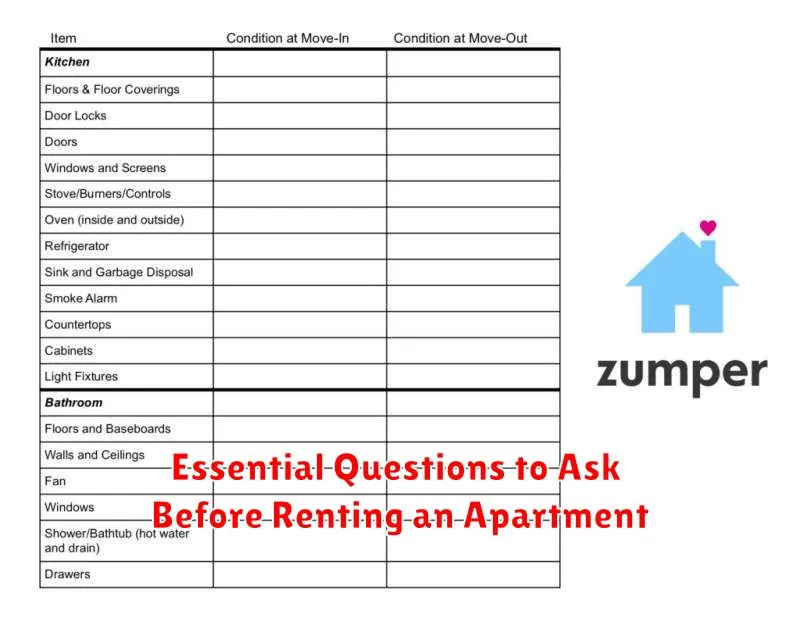Finding the perfect apartment can feel like searching for a needle in a haystack. Before you sign a lease and commit to a new place, asking the right questions is essential. This guide outlines the essential questions to ask before renting an apartment, covering everything from lease terms and cost to amenities and neighborhood considerations. Understanding these key factors will empower you to make an informed decision and secure the ideal rental for your needs. Whether you’re a first-time renter or a seasoned tenant, knowing what to ask can save you time, money, and potential headaches down the road. Don’t rush into a lease agreement without considering these essential questions.
From pet policies and parking availability to maintenance procedures and security measures, exploring these essential questions to ask before renting an apartment will help you avoid unpleasant surprises and ensure a positive renting experience. By taking the time to thoroughly investigate potential rentals and asking the essential questions upfront, you can confidently choose an apartment that truly feels like home. This article provides a comprehensive checklist of essential questions, empowering you to make a smart and informed decision in your apartment search.
What Are the Lease Terms?
Understanding the lease terms is crucial before signing any rental agreement. The lease outlines the length of the rental period, typically 6 or 12 months. Be sure to inquire about the possibility of renewing the lease and any associated terms.
Lease duration dictates your commitment to the property. A shorter lease offers flexibility, while a longer lease provides stability. Clarify whether the lease auto-renews or converts to a month-to-month agreement upon expiration. Knowing these details helps avoid unexpected costs or lease obligations.
What Utilities Are Included?
Understanding which utilities are included in your rent is crucial for budgeting. Ask your landlord specifically which utilities are covered and which you’ll be responsible for paying separately.
Common utilities include:
- Water
- Sewer
- Trash
- Electricity
- Gas
- Internet/Cable
Knowing these details upfront will prevent unexpected costs and help you accurately estimate your monthly expenses.
Are Pets Allowed?

If you have a furry, scaled, or feathered friend, it’s essential to ask about pet policies upfront. Some apartments outright prohibit pets, while others may allow them with restrictions on breed, size, or number.
Key questions to ask include whether there are pet fees (one-time or monthly), pet rent, or breed restrictions. Inquire about nearby pet-friendly amenities like dog parks or walking paths. Understanding the pet policy thoroughly can save you headaches and potential lease violations down the road.
How Are Maintenance Issues Handled?
Finding out how maintenance is handled is crucial before signing a lease. Ask about the process for submitting maintenance requests. Is there an online portal, a dedicated phone number, or do you need to contact the landlord directly?
Inquire about typical response times for both urgent and non-urgent repairs. What constitutes an emergency? Understanding these procedures beforehand can save you a lot of hassle down the line.
Also, clarify who is responsible for what. Are you expected to handle minor repairs yourself? Knowing these details upfront can prevent disagreements later on.
Is Renter’s Insurance Required?
While renter’s insurance is often highly recommended, it’s not always legally required. Many landlords now strongly encourage or even require tenants to obtain coverage as a condition of the lease. This protects both the landlord’s property and the tenant’s belongings.
Check your lease agreement carefully. It will explicitly state whether renter’s insurance is mandatory. Even if it’s not required, the relatively low cost of renter’s insurance provides valuable protection against unexpected events like theft, fire, or water damage, safeguarding your personal possessions.
What’s the Policy on Subleasing?
Subleasing, or subletting, allows you to rent your apartment to another tenant while you’re still under contract. Understanding the policy is crucial. Some landlords strictly prohibit it, while others allow it under specific conditions.
Ask your potential landlord directly about their subleasing policy. Inquire about any required written consent, associated fees, and the process involved. If subleasing is an option you may need in the future, clarifying this upfront prevents potential issues down the line.
Are There Restrictions on Renovations?
Before personalizing your potential new space, it’s crucial to understand what modifications are permitted. Landlords often have specific rules about renovations, ranging from painting walls to installing fixtures.
Inquire about any restrictions on:
- Painting: Are specific colors allowed or prohibited?
- Wall hangings: Are there limitations on the size or number of pictures, shelves, or other items you can hang?
- Permanent fixtures: Can you install new light fixtures, replace appliances, or make other permanent changes?
Understanding these limitations beforehand can save you from potential disagreements or financial penalties down the line.

